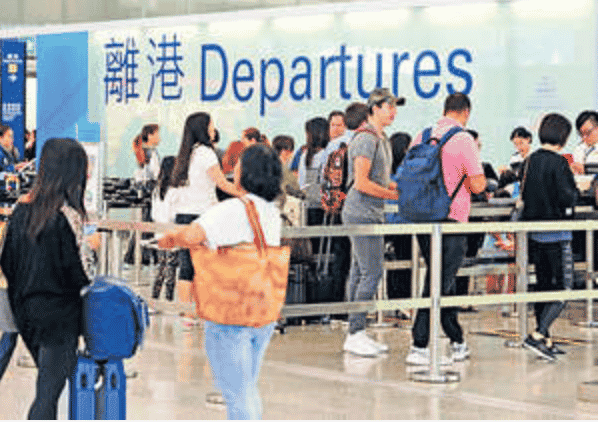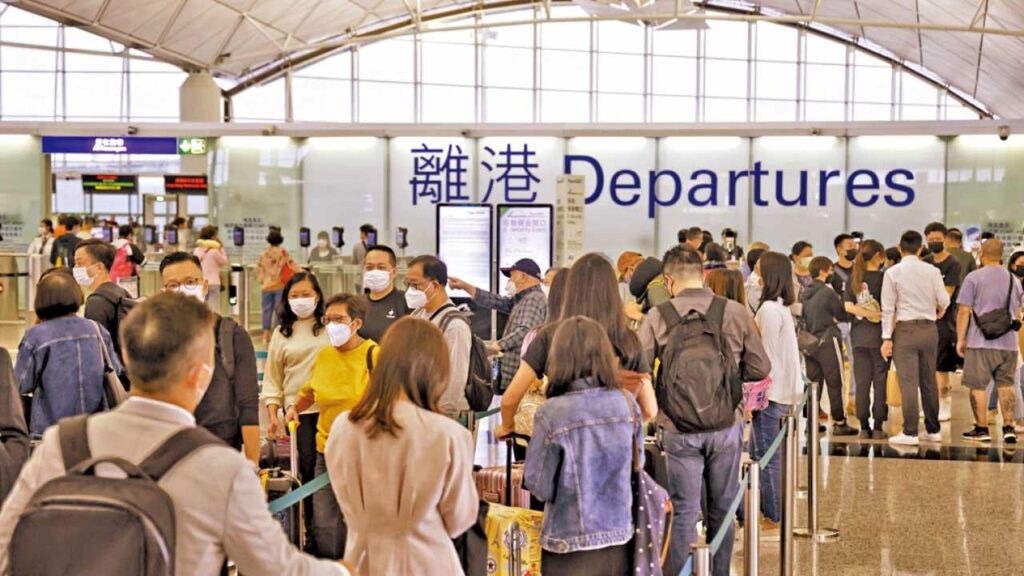Immigration overseas has once again become a topic among Hong Kong people in recent years. Some commentators believe that the current rising social dissatisfaction, coupled with the disputes over political reform and internal strife, have caused many people to lose confidence in the prospects.
There have been two waves of immigration to Hong Kong since the war. The first was triggered by the riots during the Cultural Revolution in 1967, and the second was triggered by the 1997 deadline. Some media even believe that Hong Kong is experiencing the "third wave of immigration."
Recently, at least three polls in Hong Kong have asked citizens about their intentions to emigrate. One is a poll on immigration conducted by the Asia-Pacific Research Institute of CUHK in September last year, and the other is a poll on "Hong Kong Public Opinion" conducted by the Communication and Public Opinion Research Center of CUHK in the middle of this year. The first is the poll on "political development" conducted by Democratic Ideas in the middle of this year on the "one country, two systems" index. This article attempts to analyze two questions based on the results of these three polls and other socioeconomic data: First, is the "third wave of immigration" true or false? Secondly, do citizens emigrate because they lack confidence in "one country, two systems"?
40% want to immigrate, but few take action
Although the results of the three polls are not exactly the same (I believe the main reason is the different wording of the questions), they all show that although some citizens have the intention to leave Hong Kong, not many plan to do so in the near future, and even fewer will take action. few. The poll conducted by the Asia-Pacific Institute of CUHK found that about 40% of the respondents said they would plan to emigrate "if given the opportunity", but only 10% of them (or 4.2% of the total number of respondents) had made preparations for immigration.
The Communication and Public Opinion Research Center of CUHK found that 16.1% of citizens have "thought about" emigrating, but only 2.6% of citizens have "seriously planned" emigration, and only 1.1% have "taken steps to implement" emigration. We do not know how many of the citizens who "started to tighten the immigration process" actually immigrated. However, xenophobia is prevalent internationally, and many major immigration destinations have tightened their naturalization policies. Even if citizens "take steps to tighten up" immigration, they may not be able to succeed. In summary, the number of people who verbally declare that they want to emigrate will greatly exaggerate the actual number of immigrants. Many Hong Kong media reports with headlines such as "40% of Hong Kong people want to emigrate" are far from the truth.
7,600 immigrants, lower than the 50,000 record at the time of return
The Hong Kong government does not have statistics on Hong Kong people migrating overseas. The figures quoted by the public are generally estimated by the Security Bureau based on the number of applications for "Good Conduct Certificates". According to estimates by the Security Bureau, the number of Hong Kong residents who emigrated last year reached 7,600, a three-year high compared to 6,900 in 2014. As a result, the media have been scrambling to report on the reappearance of the "immigration wave". However, it should be noted that 2014 was the lowest since the return to China. In fact, there has been no significant change in the number of Hong Kong immigrants since the return to China, and has long been maintained at about 7,000 to 8,000 people per year. The peak year after the handover was 2006, when more than 10,000 people immigrated. Last year's figure was not outstanding, and was far less than the record of about 50,000 immigrants per year in the period before the handover. It is not enough to be called an "immigration wave" at all.
The property market is still booming, but there is no talk of a third wave of immigration
Successful immigration requires several years of preparation, and the number of applications for good conduct certificates may not necessarily reflect in a timely manner how many citizens are preparing to immigrate. However, citizens' active preparation for immigration will immediately affect their desire to purchase real estate in Hong Kong. The past two waves of immigration have caused a significant drop in Hong Kong's residential property prices, but in recent years the Hong Kong property market has repeatedly hit new highs. Although there are many complex reasons for the booming property market, as the Hong Kong government continues to tighten the housing market and restrict non-permanent residents from purchasing properties, most of the recent buyers are local residents who buy houses for their own use. They are actively using their life savings to buy The "vote of confidence" in real estate is in obvious contradiction with the discourse of the "third wave of immigration." In summary, whether judging from the results of public opinion polls, good conduct certificate statistics, or the performance of the housing market, the "third wave of immigration" has not yet taken shape.
Hong Kong's loss of rationality and centrist society may lead to further division
Last month, Democratic Ideas published the "One Country, Two Systems" Index, trying to understand the reasons why citizens choose to emigrate. It found that 13.7% of citizens plan to emigrate in the next five years. Among them, 65% said that their intention to emigrate is related to their lack of confidence in "One Country, Two Systems", and 35% believe that it is related to It has nothing to do with it. Among this group of citizens who lack confidence in "One Country, Two Systems", centrists account for more than half (52%), while democrats, localists and pro-independence activists account for 43% (Note). The motivations of centrists in choosing to immigrate cannot be generalized. It may be because they are dissatisfied with the central government and the establishment, or it may be because they are disgusted with radical resistance. Both possibilities cannot be ruled out.
Brain drain is a serious social development issue for many cities. Fortunately, Hong Kong’s immigration crisis is not significant. Although the talk of a "third wave of immigration" is alarmist, the intense political debate and the public's desire to escape the turmoil are not groundless. The number of people claiming to be immigrants in polls often far exceeds the number of actual immigrants and needs to be interpreted with caution. What is certain is that if the society continues to be torn apart, what Hong Kong will lose is the moderate and rational centrists, which will further intensify the conflicts between different camps and will definitely be a warning to those in power.
Note: For detailed report, seehttp://pathofdemocracy.hk/one-country-two-systems-index/



